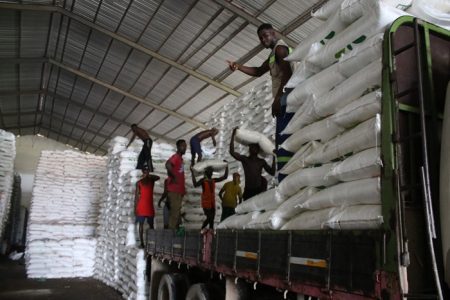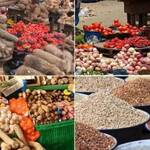The distribution of input credits under the Planting for Food and Jobs (PFJ) 2.0 initiative is currently underway.
All inputs have been successfully transported to the farming communities.
The ministry has engaged the Regional and District Departments of Agriculture and focal persons to ensure a smooth and timely distribution process.
The distribution is being handled by the District Departments of Agriculture under the supervision of the Metropolitan, Municipal, and District Chief Executives (MMDCEs).
PFJ 2.0 focuses on a value chain approach, including an Inputs Credit System, Storage and Distribution Infrastructure, Off-take arrangements or Commodity Trading, Digitized Platform, and Line of Sight Management and Coordination.
Deputy Ministers inspect distribution
Two Deputy Ministers for Agriculture, Yaw Frempong Addo and Mohammed Hardi Tufeiru, are actively monitoring the process to ensure that farmers receive these inputs timely.
Targeted support for vulnerable farmers
Minister for Food and Agriculture Dr. Bryan Acheampong, provided details on the various input packages, emphasizing the support for vulnerable groups such as female-headed households, elderly farmers, farmers with disabilities, and smallholder farmers with limited access to resources.
He has said the government of Nana Addo Dankwah Akufo-Addo continues to prioritize agriculture and has since demonstrated a firm commitment to the improvement of the sector.
That notwithstanding, the programme provides input grants to vulnerable farmers to enhance their productivity and livelihoods and ultimately build their capacity to become successful commercial farmers.
Distribution is being managed through aggregators, and farmers facing challenges should reach out to their district agriculture departments.
Package for vulnerable farmers
Each vulnerable farmer will receive three 50kg bags of NPK, one 50kg bag of Urea and one 10kg bag of maize seeds
Input credit distribution
Farmers who have applied for input credit have begun begin receiving their inputs this week.
To benefit from the programme, farmers or companies must be fully registered on the Ghana Agricultural Agribusiness Platform (GhAAP).
Input requests can be made individually or with the assistance of an aggregator or Agricultural Extension Agent (AEA).
Grants for 200,000 registered farmers
The PFJ 2.0 initiative also includes grants for the first 200,000 farmers fully registered GhAAP.
These farmers will receive two 50kg bags of NPK, one 50kg bag of Urea and one 10kg bag of maize seeds.
Registered farmers will also receive text messages directing them to collect their inputs at their respective district agriculture offices.
Support for flood-affected farmers
In response to the significant impact of the Akosombo and Kpong dam spillages on farming communities, a $40 million Food Systems Resilience Programme has been restructured to aid affected farmers.
The support package includes six 50kg bags of NPK, two 50kg bags of Urea, two liters of Nicoking, one liter of Atrazine, seeds for two-acre cereal production (maize & rice) and seeds for one-acre vegetable production (pepper and onion).
Farmers in the affected areas are encouraged to contact their district offices to receive their inputs.
Ongoing farmer registration
Farmer registration, which began on March 12, 2024, is ongoing. Farmers are urged to register through the GhAAP website (www.ghaap.com) or by contacting their district agriculture departments.
Ghana’s agricultural sector is undergoing a significant transformation, driven by the need to feed a rapidly growing population and increase food security.
MoFA emphasized that this programme is a long-term investment in Ghana’s agricultural sector, aiming to build a stronger and more resilient agricultural system that will benefit the entire country.
MoFA has been working tirelessly to ensure the effective distribution of farm inputs to farmers for the 2024 agriculture season.
The government expects this intervention to enhance productivity and foster sustainable food security resilience in Ghana.
The effort is aimed at boosting production, improving efficiency, and adapting to the challenges posed by climate change.
This programme aims to build on the successes of the initial PFJ campaign while addressing its limitations.
- Have we reaped the whirlwind? - 19 April 2025
- Fighting cocaine with the cross - 18 April 2025
- Galamsey, Cocaine: of truths, errors and the priest - 18 April 2025

